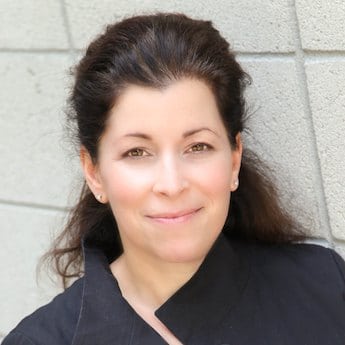The Q&A
 Tech leader Carolyn Herzog: “Anyone who makes us want to be a better person is the very definition of inspiration.”
Tech leader Carolyn Herzog: “Anyone who makes us want to be a better person is the very definition of inspiration.”
Carolyn Herzog, EVP and General Counsel at Arm (the world’s leading semiconductor IP company) shares five surprising insights about leadership, women’s progress in the workplace—and what she’d want a mentor to tell her if she were just starting out.
Q: What was your dream job as a kid, and why?
When I was 5, I told my parents that I wanted to be Diana Ross. I later changed that to Aretha Franklin. (The closest I got was winning an Air Band competition in college to the song, “Think.”) To this day, if you asked me what I would do instead of my chosen profession of law, I would tell you that I would want to be a jazz singer, much like my other great heroine Ella Fitzgerald. I even named my first daughter Ella.
One thing that I admire about musicians, beyond their raw talent and ability to transport us, is their confidence that their chosen profession is the thing that they must do. There is just no question that this is what they are meant to do in life. I realized, through many conversations with other fellow musicians and self-reflection that while I love music, I am an extrovert by nature. (So, countless hours of practicing alone is not a great fit.)
My love of travel, Africa, French and diplomatic interests fortunately led me to a job in the Africa Department at the World Bank after college and, subsequently, to law school. I still greatly admire musicians and am glad that I have some tangential role in protecting intellectual property. Not all musicians are making a living wage, and they need intellectual property lawyers to help them protect their work. (The great Aretha Franklin was instrumental in demanding value for her work in her day!)
Q: What is one of the most surprising things you have learned about effective leadership—and how did you learn it?
It doesn’t always matter what you think is right or wrong. What matters is how others perceive the situation. Your values should always guide your actions, and you should be a principled person. But you still have to lead. You still have to bring people on the journey. People will not see things through your eyes just because you believe your position is correct.
If anything is demonstrative of this, it’s the sad state of political divide that we see around the world today. Our politicians are not able to speak to each other across party lines in most countries and, as a result, they are not able to lead. If we led our companies the same way that politicians are leading our countries, we would not be showing our employees and our stakeholders the value that we believe our company (or a certain department within it) provides. We have to find common ground. No matter how strongly we may believe we are right, perception is the other person’s reality. Common ground does not imply consensus management.
Leading also requires making good, informed decisions. These decisions may not always make us well-liked or popular; but good leaders have to make difficult decisions and effectively explain why we did. We have to think about both the short- and long-term interests of our employees and stakeholders.
Q: Who or what most inspires you about women’s progress in the workplace today, and why?
Women are the largest underrepresented minority in most companies. We have an obligation to not only represent ourselves, but to represent all underrepresented minorities. One of the biggest surprises to me—when I moved to Silicon Valley, compared to Washington, DC, and London—was how different diversity looked and felt. The conversations were very open, and people wanted to do the right things; but it was very apparent to me that we still had a long way to go in recruiting and ensuring that all voices were heard in the most underrepresented environments (like engineering, sales, C-Suite and board rooms).
I grew up in a very open environment where fairness and equality were part of my upbringing. I was encouraged to use my voice and debate issues, even when my parents disagreed with my views. In today’s #MeToo environment, women’s voices are being heard more than ever. But we know that around the world, women’s voices, minority voices, LGBTQ voices, and voices of those who have been persecuted for their religious beliefs are being stifled.
It is my privilege to be able to have a voice at Arm and in the broader legal and Diversity and Inclusion community, so I use it. When I lived in the UK, I chaired the Women’s network at Symantec. I love meeting people, men and women, who I wouldn’t otherwise have the opportunity to meet because of these networks. I am now the Executive Sponsor for the Women’s Initiative because, as a woman and as a parent to two daughters, I have a particular passion for raising equality for all women. But I have a passion for equality for all people, and I want everyone who shares this passion to be a part of the discussion.
I also want everyone who isn’t sure or who may disagree to feel free to enter into the discussion. I recognize that I grew up in one environment, and other people may have grown up in another environment with very different beliefs. I am open to discussion and friendly debate. I do hope to change perceptions, but I am not here to judge.
I want our company’s opportunity for dialogue and debate to be very different from what we see in politics. We can do better. One change that is happening faster than in other areas is pay equity for women. I see that companies, including Arm, are making rapid progress on pay equality. This is both encouraging and empowering, and I hope that women everywhere are embracing the change as a positive one.
Who inspires me now? Michelle Obama. I took my daughters to see her when she was in San Jose, and I read her book, Becoming. I relate to this story. To be honest, taking my daughters to hear her rather backfired on me. I thought I was going to win some Mom points. Instead, they walked out saying things like “Michelle Obama is the coolest Mom… Michelle Obama really knows how to talk to kids …. Michelle Obama…”
But, you know, Michelle Obama really is incredibly inspiring. She is obviously brilliant, funny and talented. She appears to me to be generous, kind and philanthropic. And, she has been open and honest about her experience, her struggles and her desire to make the world a better place. Anyone who makes us want to be a better person is the very definition of inspiration.
Q: What are three of your favorite books on leadership?
- The Tao of Pooh, by Benjamin Hoff. Part of being a good leader is being a good listener and bringing out the best in the team that you have around you. Taoism is a particular way of appreciating, learning from and working with whatever happens in everyday life. Pooh may be a silly old bear, but he says the wisest things and he makes people think.
- Nice Girls Don’t Get the Corner Office, by Lois Frankel. In this book, the author calls it like she sees it; and the behaviors are, even from its first publication in 2004, those we can all recognize today.
- The Five Dysfunctions of a Team, by Patrick Lencioni. I have used this book, which is written as a leadership fable, with nearly every new team that I have taken on. It is simple and effective because everything on a team begins with trust.
Q: If you were just starting out today, what would you want a mentor to tell you?
Seek happiness. Perception is reality. Be as kind to yourself as you are to your friends. Be willing to see yourself through the eyes of others. Feedback is a gift; take it from those with good intentions (and ask for more).
Sponsored by
 Tech leader Carolyn Herzog: “Anyone who makes us want to be a better person is the very definition of inspiration.”
Tech leader Carolyn Herzog: “Anyone who makes us want to be a better person is the very definition of inspiration.”